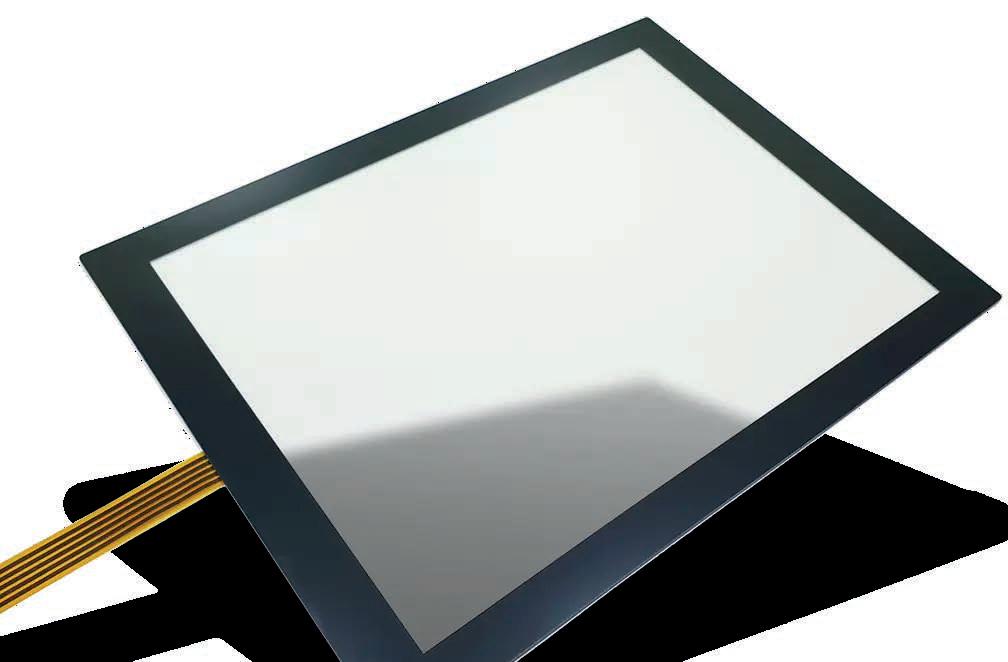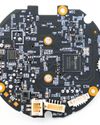
Last month I chose to use a TFT display, based on the simple fact that it was compatible with Arduino UNO shield (Circuit Cellar #409, August, 2024 [1]). That means the display mounts atop an UNO and requires no wiring whatsoever to operate. My micro of choice nowadays is an ESP32. Officially there is no UNO-format ESP32 from Arduino. They do make a NANO format ESP32, but that lacks the Arduino expansion format. Third-party companies such as Wemos offer one, but it's hardly a standard. Using an UNO or MEGA format board with a shield-compatible display board made a lot of sense.
Despite its advantages, a TFT screen cannot emit light on its own, and needs a backlight to generate an image. In this month's column, I add a resistive touchscreen on top of the TFT display
HOW TFTS AND TOUCHSCREENS WORK
TFT display: A TFT or "thin-film-transistor" technology display has a sandwich-like structure with liquid crystal material between two glass plates. Referring to Figure 1, you can see the two polarizing and RGB (Red/Green/Blue) color filters, which, combined with two alignment layers, determine the amount of light allowed to pass. An uncharged pixel allows the vertically polarized light to pass unaffected, then it gets blocked by the second horizontal polarizer. When charged, the liquid crystals bend the vertically polarized light 90°, allowing it to pass through the second polarizer. Each pixel in the active RGB matrix is paired with transistors that includes a capacitor to give each sub-pixel the ability to retain its charge. Thus, the TFT layer controls the amount of light allowed to flow through its color filter. The TFT screen, itself, however, can't emit light like an OLED display; it must have a backlight to generate the picture.
この記事は Circuit Cellar の September 2024 版に掲載されています。
7 日間の Magzter GOLD 無料トライアルを開始して、何千もの厳選されたプレミアム ストーリー、9,000 以上の雑誌や新聞にアクセスしてください。
すでに購読者です ? サインイン
この記事は Circuit Cellar の September 2024 版に掲載されています。
7 日間の Magzter GOLD 無料トライアルを開始して、何千もの厳選されたプレミアム ストーリー、9,000 以上の雑誌や新聞にアクセスしてください。
すでに購読者です? サインイン

New TI MCUs Enable Edge AI and Industry-Leading Real-Time Control to Advance Efficiency, Safety, and Sustainability
Texas Instruments (TI) introduced two new series of real-time microcontrollers that deliver advancements to help engineers achieve more intelligent and secure processing in automotive and industrial applications.

Using Amazon Alexa to Control Custom IoT Gadgets
In part two of his article, Brian describes integrating custom IoT gadgets with Amazon Echo using emulation to receive spoken alarms. In part one, he used emulation and Arduino Cloud services as a middleman.

Holiday Hangover Hardware Hacking
Having too much cheer during the holidays? In this month's article, Colin offers a diversion from the jolly season by urging developers to retreat to the basement to brush up on hardware hacking skills. He shows how a low-cost Raspberry Pi Pico and a TP-Link Tapo C200 smart IP camera could become the next automated bird deterrent or a home automation server.

Datasheet: Microamps Per Megahertz Ultra-Low Power MCUs Minimize Current Consumption
How do chip makers differentiate if many ultra-low power MCUs on the market feature the same processor core? The peripherals and different power states offer various ways to manage current consumption down to microamps per megahertz.

Smart Home Lock Down Matter Provides Security Blanket
As more devices in the smart home connect to the Internet, they become increasingly vulnerable to outside attacks. Developers can now add the latest security measures to their Smart Home devices through Matter.

Basic Pulse Circuits
In part one of a three-part series, Wolfgang wrote how basic pulse circuits help digital circuits, such as embedded boards with ARM processors, deal with pulse trains or bursts of pulses from the outside. In Part 2, he dives into enabling flip-flops, timing parameters, and synchronization, design tasks needed to capture, detect, and filter pulses.

Building a Wi-Fi Router Watchdog
Dev created a watchdog for a Wi-Fi extender using a Raspberry Pi Pico. This monitors Wi-Fi connectivity for his smart home lighting system, which would require a reset twice a year due to rapid power interruptions.

Create Your Own PCBs with a CNC Milling Machine
Using KiCad, CopperCAM, and Candle Software

Performance Bottlenecks in Embedded Linux Solutions Analysis, Identification, and Mitigation
Good performance is a requirement for every technology, and system designers rely on operating systems to ensure fast and smooth transitions in critical applications. Fortunately, Pedro writes, the embedded Linux OS offers ways for finding, analyzing and mitigating performance bottlenecks so embedded systems can deliver the speed and efficiency that end users expect.

Renesas New RA8 Entry-Line MCU Groups Brings High Performance of Arm Cortex-M85 Processor to Cost-Sensitive Applications with Market-Leading CoreMark Performance
Renesas Electronics Corp., a premier supplier of advanced semiconductor solutions, introduced the RA8E1 and RA8E2 microcontroller (MCU) groups, extending the industry's most powerful series of MCUs.